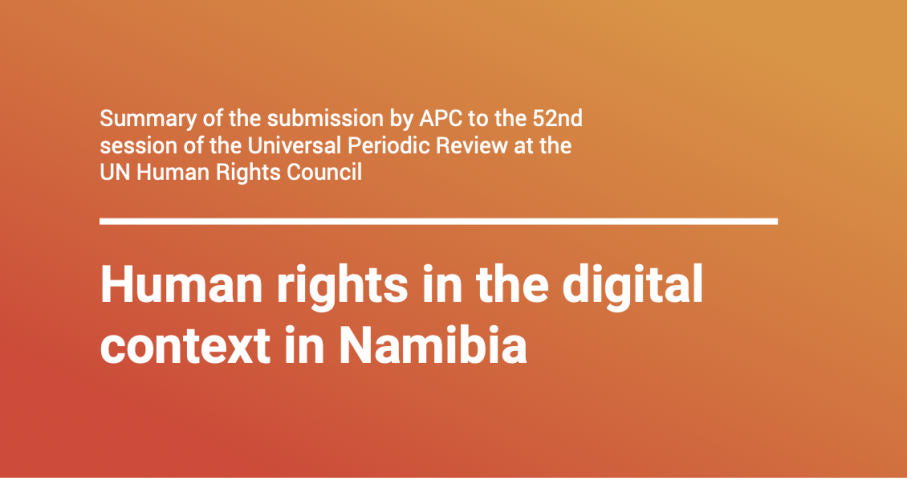
I. Context of the situation of human rights online in Namibia
Since its Universal Periodic Review during the third cycle, Namibia has taken steps to improve digital rights through the Access to Information Act and the National Cybersecurity Strategy. However, weak implementation and lack of comprehensive legislation continue to undermine digital rights. Civil society raised concerns over mandatory SIM registration, unchecked metadata retention and opaque surveillance practices. The 2024 elections saw a lot of misinformation and disinformation on social media platforms, exposing voters to manipulation. Despite these challenges, Namibia’s press freedom ranking improved in 2025. The judiciary also demonstrated its independence, for instance, by decriminalising consensual same-sex relations.
II. Digital connectivity and inclusion
Mobile broadband growth, 5G spectrum allocations and targeted Universal Service Fund investments aimed at expanding connectivity in underserved areas contributed to an increase in digital access in Namibia, leading to an estimated internet penetration rate of 64.4% at the start of 2025. While fixed broadband is growing slowly in the country, access is highly unequal, with only 16.2% of rural households having mobile internet as compared with 50.3% in urban areas. The costs of mobile and fixed broadband are high relative to income. Affordability and digital literacy remain major barriers and there is a significant gendered digital divide. The lack of a national artificial intelligence (AI) strategy raises concerns about uncoordinated AI deployment and algorithmic bias that risks harming vulnerable groups.
III. Freedom of speech and expression online and online disinformation
Namibia largely preserves a favourable environment for freedom of expression, reflected in strong World Press Freedom rankings in recent years, but the 2024 presidential and parliamentary elections saw a marked surge in misinformation on social media and targeted, gendered disinformation against female candidates. Namibia lacks laws mandating content moderation by online platforms, and the government has made minimal content removal requests. Concerns persist about shadow banning and suppression of Indigenous voices such as the Ovahimba.
IV. Right to privacy, data protection, surveillance and cybersecurity
Namibia ratified the African Union Malabo Convention in June 2023, signalling regional commitment to cybersecurity and data privacy, but domestic implementation remains slow. The country does not have a comprehensive legal framework for cybercrime and data protection. There has been a rise in cyberattacks in recent years; data breaches in 2024 and 2025 exposed personal data of thousands of individuals. A 2023 mandatory SIM registration law requiring biometric national ID linkage and five-year metadata retention has raised concerns about lack of transparency and risk of surveillance and self-censorship. The increase in collection and storage of biometric data reinforces the urgent need for strong data protection legislation.
V. Technology-facilitated gender-based violence (TFGBV) against women human rights defenders
Namibia has laws targeting gender-based violence but lacks specific laws to address TFGBV. Non-consensual image sharing and sexualised hate speech online have been on the rise. The absence of a robust data protection law makes it difficult to combat such targeting. TFGBV remains underreported and poorly addressed. Causes include a lack of training, capacity and clear protocols among both law enforcement and social service sectors. The ineffective response causes victims to retreat from online spaces, widening the gender digital divide. A disproportionately high number of women in public roles face abuse online. LGBT+ people also report very high levels of online hate, and few know about legal protections or safety measures.
VI. Key recommendations to the government of Namibia
- Ensure that digital access is inclusive and equitable by removing barriers for marginalised communities, including rural communities, women and persons with disabilities.
- Counter disinformation by promoting healthy information systems and encouraging social media platforms to take proactive measures to address disinformation and provide transparency on their algorithms and content moderation policies. Ensure that platforms comply with their responsibilities under the UN Guiding Principles on Business and Human Rights, including the right to freedom of opinion and expression.
- Enact cybersecurity and cybercrime-related frameworks that are aligned with Namibia’s obligations under international human rights law. Pass the Cybercrime Bill through ongoing open, inclusive and transparent approaches involving all stakeholders, including civil society and human rights defenders. Carry out specific gender impact assessments. Refrain from using vague and overly broad terms in criminal definitions.
- Enact a strong data protection law consistent with international standards, including necessary oversight mechanisms and recourse for breaches of personal data.
- Refrain from the use or transfer of new and emerging technologies, including artificial intelligence applications and spyware, where they are impossible to operate in compliance with international human rights law or where they pose undue risks to the enjoyment
of human rights, unless and until the adequate safeguards to protect human rights and fundamental freedoms are in place. - Enact and enhance measures and policies to prevent, prohibit, investigate and prosecute TFGBV that are gender-responsive and in line with international human rights standards.
- Provide redress and reparation as an effective, efficient and meaningful way of aiding victims of TFGBV and ensuring that justice is achieved.
- Develop effective accountability mechanisms for social media and technology companies focused on ensuring transparency and remediation to ensure that TFGBV is appropriately addressed on their platforms.